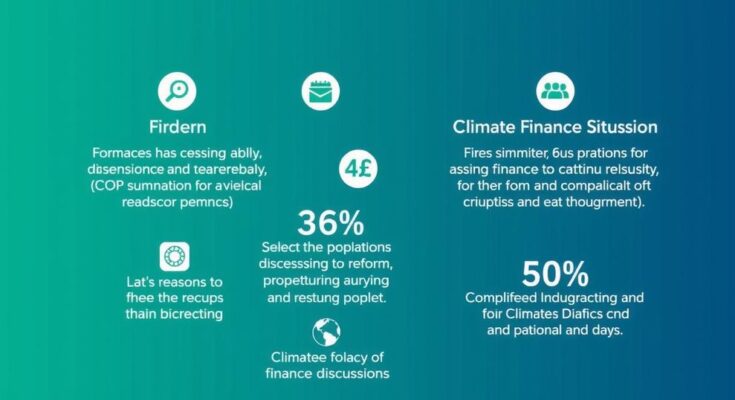This article emphasizes the need for reform in COP summits and climate finance while cautioning against limiting host nation eligibility or undermining inclusivity. It highlights the significance of the Paris Agreement in facilitating cooperation among nations and discusses innovative finance solutions like the Global Carbon Reduction Incentive. Additionally, it defends carbon pricing as an effective tool in combatting climate change despite misconceptions.
The urgent need for reform in the COP summits and climate finance mechanisms has become increasingly evident following this year’s unsatisfactory conference in Baku. While dissatisfaction with the proceedings has prompted calls for change, proposals to limit host nation eligibility or abandon the inclusive nature of the COP summits could jeopardize global cooperation essential for addressing climate change. Excluding key players, particularly petrostates, may lead to significant gaps in participation that would diminish the effectiveness of such summits. It is crucial to recognize that these climate summits extend beyond the roles of their hosts. The framework established by the Paris Agreement enables nearly 200 nations to engage in a collective effort toward accountability, resulting in significant achievements like the Paris Accord and the establishment of financing mechanisms to support climate initiatives. Nevertheless, the primary concern lies not merely in negotiations but in implementation, suggesting that action is paramount. Although shifting focus from discussion to action is necessary, dismantling existing negotiation frameworks could hinder accountability. The ratchet mechanism, which compels nations to progressively enhance their climate commitments, remains a vital tool in our efforts to combat global warming. Therefore, while reforming COP is a daunting challenge, abandoning it would render initiatives to address the climate crisis impossible. Furthermore, the discussion surrounding climate finance has overlooked effective remedies such as Professor Raghuram Rajan’s Global Carbon Reduction Incentive. This initiative would impose a levy on nations with above-average per-capita emissions, generating funds for countries with lower emissions. Countries could benefit by incentivizing reductions in emissions, potentially leading to a staged increase in levy rates, thus fostering wider participation. Critics have also misinterpreted the status of carbon pricing, which is actively utilized in 53 countries, covering around a quarter of global greenhouse gas emissions. The upcoming implementation of the EU’s and UK’s carbon border adjustment mechanisms is anticipated to enhance the global effectiveness of carbon pricing strategies. Despite its successful implementation, broader coverage and elevated prices are necessary, contingent on greater public understanding and political will.
The COP summits are critical forums for climate negotiation among world nations, yet they face scrutiny from experts who question their efficiency in recent years. The frustrations expressed during conferences, like the one held in Baku, highlight a growing sentiment that significant reform is necessary to maintain their relevance. The complexities of including all major stakeholders, particularly those heavily reliant on fossil fuels, remain a pivotal issue in discussions about climate action and finance. Proposals aimed at adjusting host nation eligibility and financing methods reflect broader frustrations with an overall lack of progress in combating climate change effectively. Recent discussions surrounding climate finance have prompted the exploration of various strategies, including carbon pricing and international incentives to reduce emissions, which are deemed vital to achieving climate goals. Experts advocate for more robust methods to mobilize funds and incentivize nations to actively participate in reducing their carbon footprints, emphasizing the importance of including all nations in the discourse.
In summary, while reforming the COP process is both necessary and complex, abandoning these critical summits would severely limit global efforts to combat climate change. Inclusivity remains essential as it facilitates accountability among nations. Furthermore, implementing effective climate finance strategies, such as carbon pricing and innovative incentive programs, will be instrumental in promoting a low-carbon transition worldwide. The call for action should remain focused on solutions that unite countries rather than exclude them from meaningful dialogue.
Original Source: www.theguardian.com




